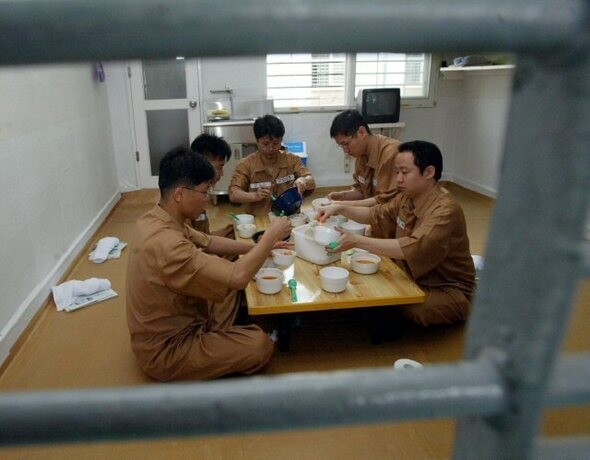hankyoreh
Links to other country sites 다른 나라 사이트 링크
Lawsuit filed for inhumane prison conditions

By Kim Kwang-soo, Staff Writer
Seo, 40, was held in a 8.64 square meter (9.6 by 9.6 feet) cell at the Busan Detention Center following his February 2008 arrest on fraud charges. For 24 hours a day, he had to share the space with anywhere from four to six other people.
When four to five people were in the cell, the only option available for sleeping was the “jackknife position,” where the occupants lay on their sides to avoid touching the next person. Those wishing to turn over in their sleep were unable to, with their cellmates packed closely together. When six people were present, they were forced to sleep with one person’s head by the next person’s feet. Legs sometimes collided. The cell’s occupants became tense whenever some tall showed up. Longer legs meant greater discomfort for cellmates, as they pushed up against their upper bodies.
Released with a suspended sentence after seven months, Seo said, “Even now, it is awful to think about that time.”
“Even if you have committed a crime, you should be allowed to sleep comfortably, shouldn’t you?” Seo added.
Seo filed a suit Wednesday demanding 30 million won ($28,170) in compensation from the state. Filing the suit with him Wednesday was Jeong, 57, who is currently at the Busan Detention Center on fraud charges. Jeong, who has been in several prisons around the country since November 2006 on charges such as larceny, demanded 71 million won in compensation, claimed that he “suffered more serious damages than Mr. Seo due to a larger period of incarceration.”
The Busan Bar Association elected to help Seo and Jeong with their case pro bono. While there have been numerous calls over the years from human rights groups and lawyers for improved treatment of prison and detention center inmates, the Ministry of Justice has refused to budge. This marks the first time inmates have filed a suit requesting compensation from the state for “damages suffered through incarceration in a small cell.”
Their aim is to bring about improvements in the environment at prison facilities, where human rights protections have been lacking, by extracting compensation for physical and psychological pain from being confined in a narrow space with poor climate control, lighting, ventilation, and toilet facilities.
“Even if it is possible to restrict a person’s basic rights after he commits a crime, this does not mean you should restrict all of them,” said attorney Yun Jae-cheol, who is representing the plaintiffs. “We need to focus efforts on improving inmate human rights in a way befitting a country that has joined the ranks of advanced nations.”
Following an examination of the incarceration conditions of South Korean inmates, the Busan Bar Association concluded that the majority of the country’s prisons and detention centers are violating Justice Ministry guidelines. The argument is that few of them are observing the “Guidelines on National Correctional Facility Accommodation Classification” established by the ministry in June 2008, which specify a per person area of 2.58 square meters or more.
The Busan Bar Association also said that while Article 9 of the United Nations Standard Minimum Rules for the Treatment of Prisoners specifies that each prisoner should “occupy by night a cell or room by himself,” South Korea is actually “legalizing group accommodation” through regulations.
An official with the Busan Detention Center said, “The reality is that when there are a lot of detainees in a limited facility, you inevitably fall short of the standard area for group accommodation.”
“It would be nice if we could have one room per person as per the UN standards, but it‘s unthinkable without money from the national budget,” the official added.
Please direct questions or comments to [englishhani@hani.co.kr]
Editorial・opinion
![[Editorial] Intensifying US-China rivalry means Seoul must address uncertainty with Beijing sooner than later [Editorial] Intensifying US-China rivalry means Seoul must address uncertainty with Beijing sooner than later](https://flexible.img.hani.co.kr/flexible/normal/500/300/imgdb/original/2024/0517/8117159322045222.jpg) [Editorial] Intensifying US-China rivalry means Seoul must address uncertainty with Beijing sooner than later
[Editorial] Intensifying US-China rivalry means Seoul must address uncertainty with Beijing sooner than later![[Column] When ‘fairness’ means hate and violence [Column] When ‘fairness’ means hate and violence](https://flexible.img.hani.co.kr/flexible/normal/500/300/imgdb/original/2024/0516/7417158465908824.jpg) [Column] When ‘fairness’ means hate and violence
[Column] When ‘fairness’ means hate and violence- [Editorial] Yoon must stop abusing authority to shield himself from investigation
- [Column] US troop withdrawal from Korea could be the Acheson Line all over
- [Column] How to win back readers who’ve turned to YouTube for news
- [Column] Welcome to the president’s pity party
- [Editorial] Korea must respond firmly to Japan’s attempt to usurp Line
- [Editorial] Transfers of prosecutors investigating Korea’s first lady send chilling message
- [Column] Will Seoul’s ties with Moscow really recover on their own?
- [Column] Samsung’s ‘lost decade’ and Lee Jae-yong’s mismatched chopsticks
Most viewed articles
- 1For new generation of Chinese artists, discontent is disobedience
- 2[Column] US troop withdrawal from Korea could be the Acheson Line all over
- 3[Editorial] Transfers of prosecutors investigating Korea’s first lady send chilling message
- 4[Column] When ‘fairness’ means hate and violence
- 5Xi, Putin ‘oppose acts of military intimidation’ against N. Korea by US in joint statement
- 6[Exclusive] Unearthed memo suggests Gwangju Uprising missing may have been cremated
- 7China calls US tariffs ‘madness,’ warns of full-on trade conflict
- 8[Editorial] Intensifying US-China rivalry means Seoul must address uncertainty with Beijing sooner t
- 9S. Korea “monitoring developments” after report of secret Chinese police station in Seoul
- 10For Korea’s Justice Ministry, no place is sacred from immigration raids